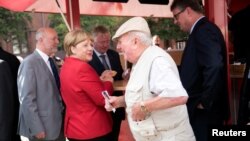The one year anniversary of Angela Merkel's fateful decision to open Germany's borders to hundreds of thousands of refugees has brought scrutiny, criticism and a flurry of new questions about her leadership.
What was she thinking when she welcomed a flood of migrants with the casual promise "we can do this", German media are asking.
Will she run for a fourth term next year in the face of unrelenting attacks from her Bavarian sister party and sagging popularity ratings? And, more immediately, can she weather regional elections this month in which voters may punish her conservatives and deliver new gains for the far-right?
If Merkel is feeling the pressure, she is doing her best not to show it. On a trip to her Baltic coast electoral district in eastern Germany this week, she visited a yacht maker, listened attentively to scientists at a plasma research institute and ate sausages with locals in the town square in Greifswald.
The trip to the state of Mecklenburg-Vorpommern, which holds an election on Sunday, followed a week of intense diplomacy in which Merkel met with a total of 15 European Union counterparts to discuss the bloc's response to the Brexit vote in Britain.
Germany, Europe and the world may be undergoing dramatic changes, but Merkel, the message from her camp goes, remains a constant — solid, a bit boring, but unflappable and above all hard-working.
To her fans, this remains her biggest strength.
"I admire her backbone, her long-term vision, the fact that she doesn't bend when the political winds blow in her face," said Cordula Arlt, 46, a Waldorf school teacher who was shopping in the Greifswald market square when Merkel visited.
But to her growing list of critics, including the Bavarian Christian Social Union (CSU) and rising anti-immigrant Alternative for Germany (AfD) party, she is seen as stubborn and tone-deaf to the concerns of ordinary Germans.
A series of attacks in Germany over the summer, two by refugees, have only deepened outrage in the anti-Merkel camp.
"People are very unhappy with her refugee policies," said Helmut Schroeder, a 61-year-old unemployed locksmith in Greifswald. "It's astonishing that one woman could take such a momentous decision on her own. We are not a monarchy."
Polarizing figure
As the voices of these voters testify, the refugee crisis, and Merkel's response to it, have turned her from a unifying, reassuring figure in Germany who was fondly referred to as "Mutti" or Mum, into a polarizing figure who elicits head-scratching and even fury.
A poll this week showed that 50 percent of Germans don't want her to run for a fourth term next year. Two in three say they are unhappy with her handling of the crisis.
Despite that, she is expected to run for and win a fourth term in 2017, a feat that only Helmut Kohl, the father of German reunification, has achieved in the post-war era.
Merkel has been coy about her intentions, in part because CSU allies are pressing her to disavow her refugee stance in exchange for their endorsement.
But her advisers suggest she will run because she sees her biggest challenges -- refugees, Europe after Brexit and the digital transformation of the German economy -- as unresolved.
"It would look like negligence if she said she didn't want to continue in the current situation," one of her close advisers told Reuters on condition of anonymity.
Merkel's backers note that despite the turmoil of the past year, her conservatives still enjoy a double-digit poll lead over their center-left rivals, the Social Democrats (SPD).
And while Merkel's popularity is down sharply, it still compares favorably with leaders in other big countries. Nor is there an heir apparent on the German right.
Still, Merkel has looked uncharacteristically vulnerable over the past 12 month. She has admitted mistakes -- in failing to foresee the tide of refugees and in her handling of an EU migrants deal with Turkey that has halted the influx but, critics say, left her susceptible to blackmail from Turkish President Tayyip Erdogan.
Major lapse
Oxford historian and author Timothy Garton Ash sees that past year as evidence Merkel may be losing her political touch.
"Merkel is Europe's indispensable leader, because of the position of Germany, but also her standing and experience as a leader," he told Reuters.
"But there is a universal law in politics that says 10 years is enough. When leaders stay longer they start making mistakes. It happened to De Gaulle, Kohl, Thatcher and to Erdogan and Putin. Now it seems to be happening to the pragmatic, cautious Angela Merkel."
Over the past weeks, German media have painstakingly reconstructed the events that led to Merkel's decision in the night of Sept. 4 last year to suspend EU immigration rules and allow thousands of refugees camped out in Hungary through to Austria and on into Germany. By the end of 2015, a million migrants had entered the country.
The consensus, one year on, is that she was right to allow the refugees into Germany on that night to avert a humanitarian crisis, but was slow to recognize the consequences of her decision and flat wrong in her assumption other European countries would help share the burden.
"There was no realization that the mood in Germany would eventually turn, nor any preparation for that day," said a senior CDU lawmaker who has worked closely with the chancellor. "For months, Merkel just dug herself in. It was a major lapse."
The political tremors are still being felt. On Sunday in Mecklenburg-Vorpommern, the anti-immigrant AfD could win more support than Merkel's CDU for the first time ever in a state vote. Two weeks later, support for her party is expected to slide to a record low in an election in the capital Berlin.
"Neither vote will be pretty for the CDU," the Merkel adviser said. "But we will move on. It won't distract her from the challenges we face in Germany and in Europe."





